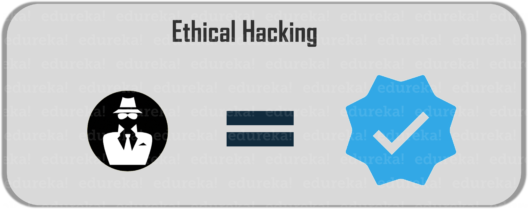Cyber Security and Ethical Hacking Internship ...
- 15k Enrolled Learners
- Weekend/Weekday
- Live Class
The term hacking has been around for a long time now. The first recorded instance of hacking dates back to the early 1960s in MIT where both the terms, ‘Hacking’ and ‘Hacker’ were coined. Since then, hacking has evolved into a broadly followed discipline for the computing community. In this “What is Ethical Hacking” article, we are going to go through the fundamentals of Ethical Hacking!
Definition: Ethical hacking involves an authorized attempt to gain unauthorized access to a computer system, application, or data. Carrying out an ethical hack involves duplicating the strategies and actions of malicious attackers. This practice helps to identify security vulnerabilities which can then be resolved before a malicious attacker has the opportunity to exploit them.
Hacking is the process of finding vulnerabilities in a system and using these found vulnerabilities to gain unauthorized access into the system to perform malicious activities ranging from deleting system files to stealing sensitive information. Hacking is illegal and can lead to extreme consequences if you are caught in the act. People have been sentenced to years of imprisonment because of hacking.
This Edureka video on “What is Cybersecurity” will help you understand the basic concepts of Cybersecurity.
Nonetheless, hacking can be legal if done with permission. Computer experts are often hired by companies to hack into their system to find vulnerabilities and weak endpoints so that they can be fixed. This is done as a precautionary measure against legitimate hackers who have malicious intent. Such people, who hack into a system with permission, without any malicious intent, are known as ethical hackers and the process is known as ethical hacking.

So now that we know what exactly ethical hacking is, and who ethical hackers are. Go through our Ethical Hacking Course to explore more about ethical hacking. This course will teach you the most current hacking techniques, hacking tools, and methods that hackers use.
Join the elite cybersecurity professionals and boost your career with CISSP Certification.
Also Read: Future Scope of Ethical Hacking
To learn about ethical hacking, it is important to understand the mindset and techniques of both black hat hackers and ethical testers. This knowledge can be applied by security professionals across various industries and sectors, including network defense, risk management, and quality assurance testing.
The primary benefit of learning ethical hacking is the ability to improve the security of corporate networks by identifying and correcting vulnerabilities. Understanding how hackers operate can help network defenders prioritize risks and implement effective remediation strategies. Additionally, obtaining training or certifications in ethical hacking can be beneficial for those looking to enter the security field or demonstrate their skills and expertise to their organization.
Gain valuable insights into the Cyber Security industry and prepare for a successful career path during this Cybersecurity Internship.
You have now understood who ethical hackers are and what ethical hackers do. Now, let’s see the different types of ethical hackers that are commonly seen.
Let’s go over the different types of hackers.
Related Post : 12 Major Ethical Issues in Information Technology
Hackers can be segregated according to their intent.
 It is another name for an Ethical Hacker. They hack into a system with prior permission to find out vulnerabilities so that they can be fixed before a person with malicious intent finds them.
It is another name for an Ethical Hacker. They hack into a system with prior permission to find out vulnerabilities so that they can be fixed before a person with malicious intent finds them.
Black Hat Hacker
 They are also known as crackers, who hack in order to gain unauthorized access to a system & harm its operations or steal sensitive information. It’s always illegal because of its malicious intent which includes stealing corporate data, violating privacy, damaging the system, etc.
They are also known as crackers, who hack in order to gain unauthorized access to a system & harm its operations or steal sensitive information. It’s always illegal because of its malicious intent which includes stealing corporate data, violating privacy, damaging the system, etc.
Grey Hat Hacker
 They are a blend of both black hat and white hat hackers. They mostly hack for fun and exploit a security weakness in a computer system or network without the owner’s permission or knowledge. Their intent is to bring the weakness to the attention of the owners & earning some bug bounty.
They are a blend of both black hat and white hat hackers. They mostly hack for fun and exploit a security weakness in a computer system or network without the owner’s permission or knowledge. Their intent is to bring the weakness to the attention of the owners & earning some bug bounty.
Related Post : Top Hacking Techniques Explained For Beginners
Now that we have discussed the various types of Hackers, let’s go over the different types of hacking. We can segregate hacking into different types depending on what the hacker is trying to achieve.
Website Hacking

Network Hacking
Hacking a network means gathering information about a network by using tools like Telnet, NS lookup, Ping, Tracert, Netstat, etc. with the intent to harm the network system and hamper its operation.
Email Hacking

 This is the process of recovering secret passwords from data that has been stored in or transmitted by a computer system.
This is the process of recovering secret passwords from data that has been stored in or transmitted by a computer system.
Computer Hacking

Ethical hacking involves simulating an attack on an organization’s IT assets in order to evaluate the security of those assets. The goal is to gather as much data as possible through reconnaissance and then use that data to scan the assets for vulnerabilities. Both automated and manual testing methods may be used in this process, as even advanced systems may have weaknesses that can be exploited. Once vulnerabilities are discovered, ethical hackers may demonstrate how they could be exploited by malevolent actors. Some common vulnerabilities that ethical hackers have encountered include:
After completing the testing process, ethical hackers create a comprehensive report outlining any vulnerabilities that were discovered, along with recommendations for how to fix or mitigate those vulnerabilities. This report may include details about the steps that were taken to exploit the vulnerabilities, as well as recommended remediation actions.
Ethical hackers should possess a diverse set of computer skills and may specialize in a particular area within the ethical hacking domain. To be effective in their roles, ethical hackers should have
Ethical hacking has certain limitations that set it apart from malicious hacking.
One key limitation is the defined scope of the testing, which means that ethical hackers cannot go beyond a certain boundary in order to make an attack successful. However, it may be appropriate to discuss potential attacks that fall outside of the defined scope with the organization.
Another limitation is the availability of resources, such as time and budget, which may be more constrained for ethical hackers than for malicious hackers.
Additionally, ethical hackers may be required to adhere to certain restrictions on the methods they can use, such as avoiding test cases that could cause servers to crash (e.g., denial of service attacks).
Ethical hacking involves legally breaking into computers and devices to test an organization’s defenses. It’s also known as penetration testing or white-hat hacking.
An ethical hacker is a computer security expert who systematically attempts to penetrate a computer system, network, or application on behalf of its owners to find security vulnerabilities.
Yes, it’s a growing field with increasing demand for professionals in various sectors like IT, banking, government, and healthcare.
The average monthly salary of an Ethical hacker in India is ₹519,337 per year as per Payscale reports. The monthly average salary ranges from 24T to 1L as per Glassdoor.
Ethical hackers have authorization to break into the systems and look for weaknesses, unlike malicious hackers who illegally breach systems to steal or damage data.
Essential skills include programming, networking, and database management knowledge, along with a thorough understanding of security protocols and measures.
Yes, certifications like Certified Ethical Hacker (CEH), Offensive Security Certified Professional (OSCP), and Certified Information Systems Security Professional (CISSP) are recognized in the field.
Ethical hacking is legal as it is performed with the permission of the organization or individual who owns the system.
Techniques include vulnerability scanning, penetration testing, social engineering tests, and security audits.
It helps organizations identify and fix security vulnerabilities, preventing breaches and protecting sensitive data.
Yes, it’s a growing field with increasing demand for professionals in various sectors like IT, banking, government, and healthcare.
Ethical hackers assess the security posture of an organization, report vulnerabilities, suggest improvements, and sometimes help in implementing these security measures.
Ethical hacking is broader, covering all methods to find system vulnerabilities, while penetration testing is a focused attempt to exploit these vulnerabilities.
A wide range of organizations, including government agencies, financial institutions, healthcare organizations, and IT companies, hire ethical hackers for security.
Yes, based on their roles and methods, ethical hackers can be classified as white hat, grey hat, or black hat, with white hat being the legal and ethical one.
They provide detailed reports including the vulnerabilities found, the methods used to exploit them, and recommendations for remediation.
Ethical hackers must obtain proper authorization, respect privacy, report all findings, and avoid data damage.
With the proper training, skills, and ethical mindset, anyone can aim to become an ethical hacker. However, a strong background in IT and security is often essential.
As cybersecurity threats evolve, the demand for ethical hackers is expected to grow, making it a field with strong future potential.
Yes, knowledge of programming languages like Python, JavaScript, SQL, and C++ is often crucial for understanding and exploiting system vulnerabilities.
Ethical hackers commonly use tools like Nmap for network mapping, Metasploit for vulnerability exploitation, Wireshark for packet analysis, and Burp Suite for web application security.
Okay, guys, this brings us to the end of this “What is Ethical Hacking?” blog. This is the first blog in a long list of ethical hacking blogs that I’m going to publish. For more information regarding cybersecurity, you could check out my other blogs. If you have any doubts or queries regarding this particular article, leave a comment in the comments section below!
If you wish to learn Cybersecurity and build a colorful career in cybersecurity, then check out our Cyber Security Course Online which comes with instructor-led live training and real-life project experience. This training will help you understand cybersecurity in-depth and help you achieve mastery over the subject.
You can also take a look at our newly launched course on CompTIA Security+ Training Course which is a first-of-a-kind official partnership between Edureka & CompTIA Security+. It offers you a chance to earn a global certification that focuses on core cybersecurity skills which are indispensable for security and network administrators.
Learn Cybersecurity the right way with Edureka’s Master’s in Cybersecurity program and defend the world’s biggest companies from phishers, hackers and cyber attacks.
 Thank you for registering Join Edureka Meetup community for 100+ Free Webinars each month JOIN MEETUP GROUP
Thank you for registering Join Edureka Meetup community for 100+ Free Webinars each month JOIN MEETUP GROUPedureka.co
Thanks for sharing this content with us, your content is really helpful for me, you describe it very well and keep posting.
Thank you for this very much useful information
Best Ethical Hacking training
thank you